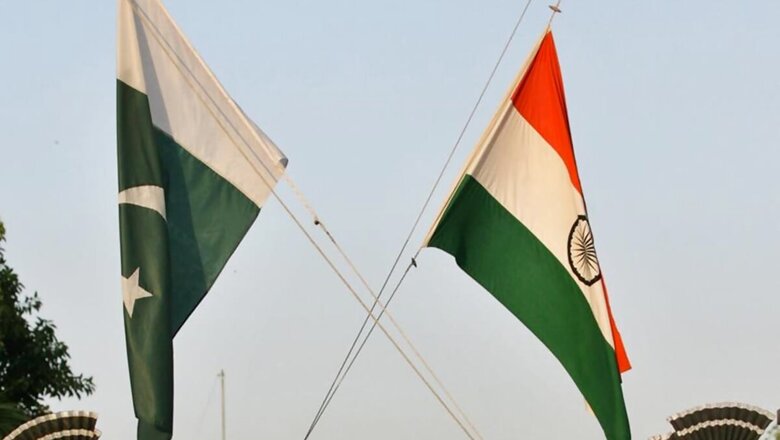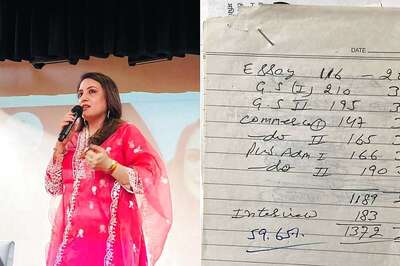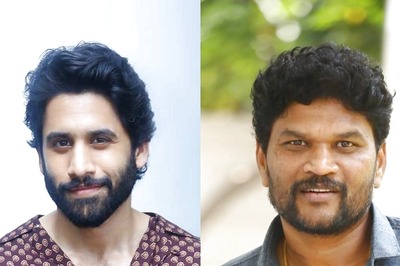
views
India and Pakistan have agreed to strictly observe all agreements on ceasefire along the Line of Control (LoC) and other sectors, according to a joint statement. The decision on ceasefire, effective since Wednesday midnight, was taken at a meeting between the Director Generals of Military Operations (DGMOs) of India and Pakistan.
In order to make sense of the deal and to understand the way ahead, News18 spoke to G Parthasarathy, former high commissioner of India to Pakistan, Australia and Cyprus. He was also Ambassador of India to Myanmar.
Edited excerpts:
How do you perceive the LoC ceasefire deal with Pakistan?
I welcome this decision. But we would also have to bear a couple of points in our minds. We’ll have to see what position Pakistan is in at the present moment. It is bankrupt, cannot repay its debts even to Saudi Arabia. It borrows from Chinese commercial banks to repay the Saudis. So, at this point in time, the best step for us is to adopt a low-key posture, while we assess Pakistan’s intentions.
Moreover, there is an asymmetry in the way the two sides function. The army calls the shots in Pakistan on any dialogue with India. It is not so in India. There should, therefore, be designated negotiators from both sides to determine what the framework would be for such discussions. We already have a Joint Commission headed by the Foreign Ministers to discuss the entire range of issues two sides have.
Going back to the past, we got an assurance from Pakistan in the meeting between Mr Atal Bihari Vajpayee and General Musharraf in 2004, when General Musharraf assured India that “territory under Pakistan’s control” would not be used for terrorism against India.
“Back Channel” negotiations between Special Envoys of India and Pakistan then went ahead. There was no Pakistan sponsored terrorism for a couple of years. The issue of Jammu and Kashmir was discussed at length in “Back Channel” and negotiations between Special Envoys of the two countries. Knowledgeable people from both sides acknowledge considerable progress was made in moving forward. But at the same time the Foreign Ministries remained in touch to discuss other issues.
In short, I would proceed in a measured a manner until I see how serious the Pakistanis are about ending terrorism irrevocably. So, we should take one thing at a time. Meanwhile, we should keep our powder dry.
What is your take on the entire transgression and de-escalation with China?
Firstly, it naturally took time for us to build up our military presence and firepower in Ladakh to meet the Chinese escalation. We had, after all, to flood the entire area in Ladakh with tanks, artillery, together with fighter aircraft and logistical support. The Chinese were surprised and stunned once we took over the Kailash ridges. Once that happened, the Chinese were more ready to have negotiations. We reached a ceasefire agreement, based on mutual withdrawals.
We will have to wait and see where this leads us to because we have serious concerns. We had earlier demanded that the Chinese should withdraw to positions they held at the beginning of April 2020. Their continuing presence in Depsang Plains and adjacent areas cannot be ignored.
Do you think post pandemic India has been able to handle China diplomatically well?
Yes. I think that in a way, the Chinese have been their own worst enemies because they have transgressed maritime and land boundaries of every one of their neighbours. We know of at least nine cases where they have violated maritime boundaries of others. And they earlier had problems with land boundaries with every other neighbouring country, including Russia.
The Chinese are not very popular in their neighbourhood. They may be the most powerful country, but are known to use force to settle differences over land and maritime boundaries in relations with virtually all their neighbours.
How do you think the vaccine diplomacy worked for India?
Let me put it this way- we certainly built up a huge capability for vaccines. We’ve for a long time been suppliers of emergency medicines all over the world. This shortcoming we are seeing was foreseen and our capacities were built up. So, at a certain point in time, we got the vaccines well ahead of others in the world, and, therefore, had a surplus. Rather than just preserve the vaccines for ourselves, like many other countries have done, we realised that this was a time when we could help our neighbouring countries who were in dire need of vaccines. The vaccines are now distributed free of cost to those countries in dire need and unable to bear the costs.
We also linked our capability with domestic consumption. Don’t forget, distribution for domestic consumption in India, is a tough task. Is it going to be the private sector? Is it going to the public sector? You have to make a distinction between reliability and speed. Earlier on, the focus was on equity. Now it is also on speed, but mostly on a healthy mix of equity and speed.
Do you think US President Joe Biden’s polices will be beneficial for India? How?
Economically, Trump’s policies were disastrous for us. We had little interest in foreign investment in the Trump era. He was primarily a protectionist, focused on the United States only. More importantly, he placed unwarranted duties on a series of our major exports. These actions were in violation of the WTO regulations.
Biden is outward looking, and we expect those unwarranted Trump era duties to be removed. We are set on becoming an investment friendly country, welcoming foreign investment in a big way. This has also come at a time when fewer people are interested in investing in China. So, let us see how that shift goes. It could either go in India’s favour, it could go to Vietnam, Taiwan, South Korea or any ASEAN country. But our aim is to get a good share of the new foreign investment.
Do you think India is better placed as compared to the other ASEAN countries in terms of attracting investment?
No. Let me put it this way. It is much easier for foreign investors to set up and do business in Vietnam or Taiwan, as compared to India. In India, there are many hurdles on the way. It’s not just the Union government, but the states also. Yes, things are improving – but let’s be real. If you are an investor, you would much prefer to go to Vietnam, Taiwan, South Korea, or Singapore, rather than to India. This will not change unless we radically alter our industrial and business procedures and thinking.
What role do you think India needs to presently play with regards Myanmar?
The role has been already manifested in the UN Security Council where we were able to get a consensus on a resolution, calling for the early restoration of democracy. Let me be very clear – the military will not walk away in a hurry. The last time they were there, they remained for over 25-30 years. So, what we can work for is a return to the position, which existed before the takeover. It will take time and will need persuasion. India’s role has always been one of using, friendly persuasion.
I recall that before the Myanmar leadership announced its move to democracy, President Kalam met the Myanmar President Senior General Than Shwe in Yangon, and very politely and quietly told him that Myanmar is a great civilization and a friendly neighbour of India. The military had brought the country unity and prosperity. But, it would be good for Myanmar to move towards democracy. A year later, Myanmar moved towards democracy in a measured and dignified manner. Getting Myanmar to move towards democracy is a task in which we should join others, while acting in a quiet and discreet manner, along with other friendly countries.
Read all the Latest News, Breaking News and Coronavirus News here


















Comments
0 comment